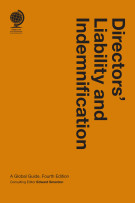Challenging family enterprise governance: resigning versus resignation
17 March 2015

Author bio coming soon
This is the second in a series of posts on family enterprises by Richard L Narva, the founder of Narva & Company and consulting editor of the Globe Law and Business title just published: Family Enterprises: How to Build Growth, Family Control and Family Control.
Here is a nasty little secret about corporate governance in family-controlled companies: no one ever resigns as a matter of principle, even when use of this ‘nuclear option’ is clearly called for by the facts of the situation.
For virtually my entire career as an adviser to family-controlled companies, I have endeavoured to persuade my clients that either adding directors independent of management to their board of directors or creating a non-fiduciary council of advisers would enhance their competitiveness and improve their bottom line. Most of them have concurred, eventually. I have participated as governance architect, independent director, independent trustee or council of adviser participant in more than 75 governance bodies for family-controlled companies, both publicly traded and privately held. But in 35 years of advising family firms and the family shareholders that control them, I have witnessed resignation as a matter of principle only once.
Some situations expose the hidden underbelly of corporate governance in family firms – that loyalty to the controlling family can erode and eventually undermine an independent director's commitment to his or her sense of urgency about taking a dissenting position on a matter of principle. There are at least three exceptions to the rule that independent corporate governance correlates positively to enhanced performance of a family-controlled company. These exceptions include at least the following three scenarios.
When owner/managers are leading the family firm to disaster
Business advisers to family-controlled firms often lack the theoretical knowledge and/or the combat training of clinically trained professionals when it comes to understanding the power of family systems generally and patriarchal systems in particular. It rarely occurs – even to battle-hardened independent directors – what part of their own psychological history draws them to accept a governance role at a family-controlled firm under the active leadership of a member of the founding family. Generally speaking, such independent governance voices bring both expertise and a window onto the world of business outside of insular, albeit successful, family-controlled enterprises. But I have seen too often that such personal independence in a non-family director is no match for the assiduous application of a family business leader’s interpersonal relationship skills. And if the family business chief executive is applying his or her formidable energy in pursuit of ill-conceived strategies or objectives, the likelihood of hoodwinking otherwise independent directors into silence, or even into complicit agreement, is real and discernable.
When the governance process degrades into a ritual dance
In many enterprises corporate governance is constructed like a Potemkin village – all facade and no substance. I was once elected to the board of directors of such a company as part of the settlement of litigation between sibling shareholders. It was a company with annual revenues above $1 billion and the appearance of effective corporate governance. Board meetings were duly noticed and convened like clockwork on a quarterly basis. Agendas were lengthy and board and committee meeting time was consumed with numerous, highly detailed presentations on the past quarter's operating results. Votes were always nearly unanimous. All that was missing was debate. Not even the appearance of robust discussion was tolerated by the chief executive. These board meetings were all form and were devoid of substance because the long-time chief executive could not abide even the most tepid debate in a setting where he and his allies on the board were guaranteed to prevail on every vote.
When family values are conflated with the CEO's narcissism
Unfortunately, sometimes adherence to family values or loyalty to the family itself is invoked disingenuously by a family member who leads a family firm in order to garner support for the status quo and/or opposition to a new business policy that he or she disdains. When such parochial appeals overwhelm the courage of management to make tough decisions, both the fabric of the family and the best-laid plans of the business can unravel. When directors and advisers fall for this ploy, manipulative management prevails and family solidarity is squandered in the service of one family member's ego.
Each of these three exceptions to effective, independent corporate governance rests on the collective behaviour of independent directors and/or advisers that I call the ‘abdication conspiracy’. Much like the ‘succession conspiracy’ elucidated by Ivan Lansberg decades ago in his classic Family Business Review essay, the abdication conspiracy is implicit, not explicit; driven by judgements and decisions that are concurrent, yet unarticulated; and usually motivated by deeply held, but often unfounded fears about the enterprise, the family that controls it and leadership of the entire family-business system. Fortunately, there are several cures for this malady.
The cures
Transparency
As Justice Brandeis once quipped, "sunlight is the best disinfectant”. Regular, comprehensive disclosure of important issues, starting with financial disclosure and analysis, should become the cornerstone of every family-controlled enterprise's governance culture. Like all cultural norms, transparency takes time to take root in board meetings. But any director paying attention can see it coming.
Robust debate of business issues
After disclosure comes debate. Independent directors can create a culture of robust debate. And they should endeavour to do so unconstrained by fears of resistance from management or family. Vigorous, civil debate need not be sacrificed on the altar of respect for the family. Families which control substantial companies may not favour open debate because it is not part of the culture of the founding family and is therefore an unfamiliar behaviour to them. But that does not mean that such debate cannot become learned business behaviour. In this arena, independent directors have a duty to teach and family-control groups have a duty to learn. Generally, while reticent, such families are strong enough to master good debating skills.
Resignation
But there are times when even the most skilled, assiduous directors cannot initiate governance behaviours such as transparency and robust debate. And when a director takes cognisance of such systematic governance failures and discerns shortsighted strategies or unprincipled leadership, it is time to go. Advisers advise – as do directors, when the family controls the board votes – and owners decide. Therefore, when an independent director’s only tool is resignation and the facts warrant its use, directors and advisers should not fear to pull the trigger. In my experience, resignation can prove to be a surprisingly powerful intervention, albeit one that is rarely used.
Click here for a free sample chapter of the new book Family Enterprises: How to Build Growth, Family Control and Family Control and to order your copy.













Any comments - send us an email